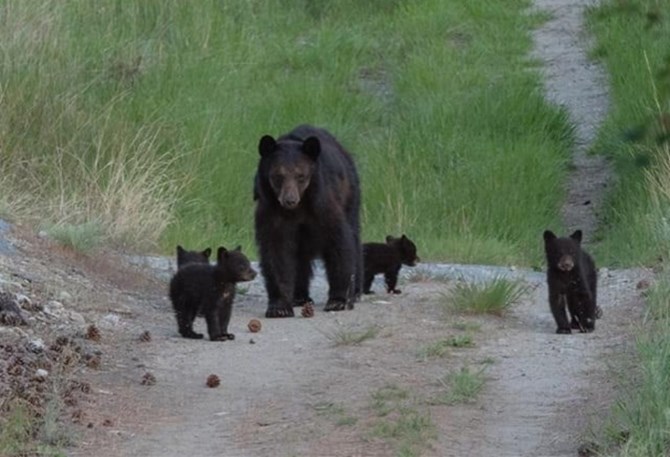
FILE PHOTO - WildSafeBC is reporting a sow bear and five cubs were spotted in Penticton's Wiltse neighbourhood, Monday, May 19, 2020. Four of the five cubs can be seen in this submitted photo.
Image Credit: SUBMITTED / Wildsafe BC
May 23, 2020 - 8:45 AM
WildSafeBC is asking people in Penticton be be bear aware after a sow and five cubs were spotted earlier this week in one of the city's neighbourhoods.
The sow and her five cubs were first seen in the Wiltse neighbourhood in the upper Evergreen Drive area, May 19.
“A sow in good shape usually has one to three cubs. Even three cubs is unusual, four or five is highly unusual,” WildSafeBC community coordinator Zoe Kirk says.
The sow did not likely "adopt" cubs from another sow who died, she says.
“They don’t generally adopt other cubs. The photo shows a pretty standard family, a larger cub, a runt and a couple in the middle, that’s pretty standard nature fare,” she says.
The mother’s ability to bear four or five cubs is based mainly on finding a beneficial and regular food source, high in calories and protein.
“We don’t know for sure why this sow would have so many cubs, but a constant and available food source is a key,” she says. “Any number of cubs over three is a rarity.”
Kirk hopes Penticton residents in the Wiltse area have gotten the bear aware message and are working to keep bear attractants at a minimum.
“We can’t definitively say there were five cubs, as there were only four in the photo, but the photographer said he counted five,” Kirk says.
Kirk has been working with the City of Penticton to get the bear aware message out, particularly since five bears had to be put down in the same neighbourhood in October, 2019.
“We want to make sure the neighbourhood and people using trails up in that area are aware. We want to ensure she doesn’t come back down into the neighbourhood,” Kirk says.
Kirk isn’t aware of any new sightings of the bear or her cubs.
“Chances are, if we all manage ourselves, she will be able to feed those cubs and not be lured into the community. It won’t be easy for her. She’s come out of the den with 30 per cent less body weight, and she will be losing body fat feeding her cubs. She’ll be hungry, and actively searching for food.”
She may also have to protect the cubs from predatory male bears, who have been known to feed on cubs, she says.
To contact a reporter for this story, email Steve Arstad or call 250-488-3065 or email the editor. You can also submit photos, videos or news tips to tips@infonews.ca and be entered to win a monthly prize draw.
We welcome your comments and opinions on our stories but play nice. We won't censor or delete comments unless they contain off-topic statements or links, unnecessary vulgarity, false facts, spam or obviously fake profiles. If you have any concerns about what you see in comments, email the editor in the link above.
News from © iNFOnews, 2020